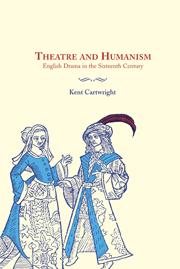Book contents
- Frontmatter
- Contents
- Acknowledgments
- Introduction
- 1 The humanism of acting: John Heywood's The Foure PP
- 2 Wit and Science and the dramaturgy of learning
- 3 Playing against type: Gammer Gurton's Needle
- 4 Time, tyranny, and suspense in political drama of the 1560s
- 5 Humanism and the dramatizing of women
- 6 The confusions of Gallathea: John Lyly as popular dramatist
- 7 Bearing witness to Tamburlaine, Part 1
- 8 Robert Green's Friar Bacon and Friar Bungay: the commonwealth of the present moment
- Afterword
- Notes
- Index
7 - Bearing witness to Tamburlaine, Part 1
Published online by Cambridge University Press: 22 September 2009
- Frontmatter
- Contents
- Acknowledgments
- Introduction
- 1 The humanism of acting: John Heywood's The Foure PP
- 2 Wit and Science and the dramaturgy of learning
- 3 Playing against type: Gammer Gurton's Needle
- 4 Time, tyranny, and suspense in political drama of the 1560s
- 5 Humanism and the dramatizing of women
- 6 The confusions of Gallathea: John Lyly as popular dramatist
- 7 Bearing witness to Tamburlaine, Part 1
- 8 Robert Green's Friar Bacon and Friar Bungay: the commonwealth of the present moment
- Afterword
- Notes
- Index
Summary
In Christopher Marlowe's Tamburlaine, Part I, the hero succeeds by overcoming increasingly powerful opponents who refuse to grasp his inevitability and provenance. What resistance does the play overcome as a means to success in performance? Marlowe's piece apparently had the effect of conquest. According to Richard Levin, Elizabethan playgoers responded with wonder, conveyed in such language as “gapers,” “gazing,” “rauishes,” “dead stroke,” and “strike … dead with admiration.” Gaping, admiration, and ravishment occur elsewhere in descriptions of Renaissance drama, but they adhere to Tamburlaine insistently. Because not every Elizabethan stage warrior will strike spectators dead with admiration, the responses to Tamburlaine bespeak a certain transference, as if what Tamburlaine does to his opponents, the play does analogously to the audience. Part of the drama's originality lies there: Tamburlaine induces and then defeats audience resistance, as if Marlowe wills on his spectators the paradox of the vanquished Soldan: “And I am pleasde with this my overthrow” (I.i.482).
Criticism continues to turn on the question of whether Tamburlaine is repellent or admirable – or both. Wishing to discredit Tamburlaine's “hero ideology,” political critics see the play as exposing the protagonist's imperialistic strategies and pronounce auditorial disaffection an appropriate response. By contrast, theatrical criticism tends to treat the spectators' engulfment by Tamburlaine as normative – as Levin's historical evidence suggests. Engulfment can blur into approval, however, as the ideological critics fear, who are left insisting that “Though [Tamburlaine's] claims to divine sanction work on his onstage audiences, they should not work on us.”
- Type
- Chapter
- Information
- Theatre and HumanismEnglish Drama in the Sixteenth Century, pp. 194 - 221Publisher: Cambridge University PressPrint publication year: 1999



